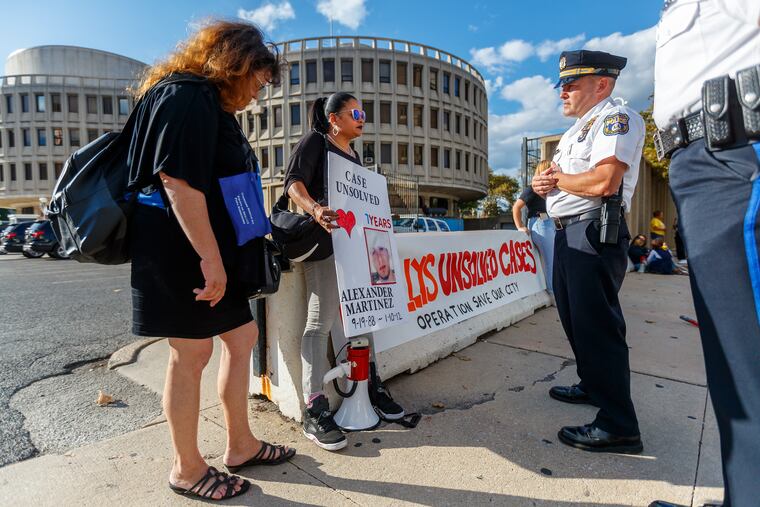A grieving mother is staging a three-day silent protest against gun violence in Philadelphia. It’s not too late to support her. | Helen Ubiñas
“What about us?” loved ones of unsolved murder victims ask.

She began the day the way she always has when doing something in her son’s name.
At his graveside.
Later in the afternoon Tuesday, she planned to be outside Police Headquarters for an hour, for the first of a three-day silent protest she organized to call attention to Philadelphia’s unsolved murders.
With our miserable clearance rates, she expected lots of company. As our editorial department so soberingly put it, you are more likely to win a coin toss than be caught for murder in Philadelphia.
But first, Lisa Espinosa wanted to talk to her youngest, Raymond Pantoja, a 26-year-old father killed on April 10, 2016, outside a nightclub at B Street and Allegheny Avenue in Kensington.
His case was eventually solved, but it took some doing. Her doing, to be exact.
She was relentless, and when six months later police charged a man with killing her son, the detective who worked the case conceded that it couldn’t have been done without her help.
» READ MORE: From 2016 - With arrest, a mother's prayers answered | Helen Ubiñas
The man who killed her son is to be sentenced next week.
As hard as it will be to be in the same room as that man, she knows she is luckier than most.
Which is why even after she recently moved to Arizona to care for her ailing mother, she vowed to continue the fight for those who know the pain of losing a loved one and for those who one day will, if Philadelphia doesn’t put more of its killers behind bars.
Graveside, she spoke to RJ: “Maybe if we would have gotten involved sooner, things would be different. Maybe you’d be more aware of the violence. Maybe you’d still be alive.”
Maybe if people understood how violence impacts everyone in this city more people would have joined her.
Tuesday evening, Sophia Fleming stood outside the Roundhouse with a sign that read: “Where is our justice.”
A few more years and the 2004 murder of Fleming’s 17-year-old son, Adam Hammer, will have gone unsolved longer than he was alive.
On the sidewalk outside her home sits a memorial set up by a mother whose son’s 2016 murder also remains unsolved.
Fleming stood next to Rosalind Pichardo, who held her own sign for her brother Alexander, whose 2012 murder is also unsolved.
Police Capt. Stephen Clark came out to talk to them. He promised to pass their information along to the homicide department and urged them to check out the website for unsolved murders, which the department launched last month.
» READ MORE: Philly’s new website for unsolved murders is a grim reminder of the deaths we don’t pay attention to | Mike Newall
The mothers who showed up were aware of the site, and hopeful that it meant more attention would be paid to solving murders in the city. But they wondered the same thing:
Why did it take so long? In fiscal year 2017, the homicide clearance rate in Philadelphia was 37 percent. In 2018, 47 percent. Of the 249 homicides in Philadelphia so far this year, 136 — 53.63 percent — were cleared, according to police. The numbers are going in the right direction, but they’re still lower than the national clearance rate.
Plenty of reason to be concerned, outraged even. To demand better. But only a handful of people showed on Tuesday.
With the amount of unsolved cases they should have wrapped around the Roundhouse several times.
Espinosa was disappointed. She had been planning and promoting this protest for months.
I wouldn’t have blamed her if she packed up and said she was done. Her son’s case had been solved, after all. But instead she reminded herself that sometimes even with the best of intentions, the weight of grief can immobilize you.
She also knows what everyone who skipped out on the protest should: that no one will speak louder on behalf of your loved ones than you. No one will fight harder. And nothing will change if you don’t show up and demand it.
Espinosa held out hope that more people would come on Wednesday, the National Day of Remembrance for Murder Victims, or Thursday.
She will be there both days at 4:30 p.m. Join her.